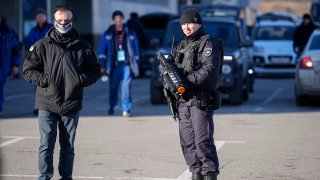
When discussing the biggest threats facing the United States these days, U.S. intelligence officials invariably mention China and Russia, then often segue to cyberattacks, pandemics and climate change.
Islamic extremist terrorism, which animated American foreign policy and defense strategy for a decade and a half after the terrorist attacks of Sept. 11, 2001, has receded as a top-tier concern.
The attack that killed 133 people in a Moscow concert hall Friday is a reminder, however, that the terrorism threat still looms.
The group that claimed credit, an offshoot of ISIS called Islamic State in Khorasan, or ISIS-K, has eclipsed the once-fearsome core ISIS organization in Iraq and Syria as perhaps the most dangerous terrorist organization, U.S. officials and outside experts say.
Get South Florida local news, weather forecasts and entertainment stories to your inbox. Sign up for NBC South Florida newsletters.
“It’s becoming more of a regional actor,” said Daniel Byman, a counterterrorism specialist at Georgetown University. “It claimed responsibility for the attack in Iran in January, and now we have this devastating attack in Moscow.”
The Iran attack was a double suicide bombing that killed almost 100 people at a memorial for the Revolutionary Guard commander Qassem Soleimani. U.S. officials say ISIS-K also was responsible for the 2021 Abbey Gate bombing outside Kabul’s Hamid Karzai International Airport that killed 13 American service members and 170 Afghan civilians.
U.S. & World
Although U.S.-backed fighters five years ago drove the core ISIS from its so-called caliphate in Syria and declared victory, the remnants of the group remained. ISIS-K is believed to be active in Afghanistan, Pakistan and Iran, and appears to have aspirations to attack Europe and the U.S., American officials say.
According to a July 2023 report to the United Nations Security Council, ISIS-K counts 4,000 to 6,000 members on the ground in Afghanistan, including fighters and their relatives.
To be sure, even if most of the U.S. public has largely stopped thinking about groups like ISIS, American defense officials have not. Gen. Michael Kurilla, who heads U.S. Central Command, told a House committee last week that ISIS-K “retains the capability and the will to attack U.S. and Western interests abroad in as little as six months with little to no warning.”
He also warned that core ISIS members are languishing in Syrian detention camps.
“Over 9,000 detainees across 27 different detention facilities in Syria,” Kurilla said. “We need to repatriate those detainees to either face prosecution or reintegration, rehabilitation, back into their societies.”
The good news, from the American perspective, is that the U.S. appears to have significant intelligence insights into the plans and intentions of ISIS-K. U.S. officials warned both Iran and Russia that ISIS-K was poised to attack in those countries before the fact. Putin rejected the warning, but the the U.S. Embassy in Moscow issued a public statement warning Americans to stay away from concert halls.
“That’s pretty impressive,” Byman said. “It shows that U.S. counterterrorism capabilities remain an important factor. If they are trying to do something in Europe or the United States, there is at least a reasonable chance U.S. intelligence might be able to detect it.”
Still, American officials worry that, while they may detect planning that involves a number of terrorists, they cannot guarantee they will discover a plot that involves sending one or two people into the U.S., or one that involves a lone extremist who is already in the country.
Islamic State in Khorasan was founded in 2015 by breakaway members of the Pakistani Taliban. It includes people of Afghan and Pakistani origin, as well as Central Asians. The group is now at war with the Taliban government in Afghanistan, which puts it under pressure.
“I would say that ISIS-K poses a bit of a larger threat, but they are under attack from the Taliban regime right now,” Lt. Gen. Scott Berrier, head of the Defense Intelligence Agency, told senators earlier this month. “And it’s a matter of time before they may have the ability and intent to actually attack the West at this point.”
A number of ISIS-K plots in Europe have been disrupted, Byman said, including with a wave of arrests of people from Central Asia in Germany and the Netherlands in July.
In January, Turkish officials say two masked members of ISIS-K attacked and killed a person at a Catholic Church in Istanbul.
Russia, which invaded Afghanistan in the 1980s, crushed a rebellion in Muslim-majority Chechnya in the 1990s and backed the Syrian government against ISIS in the 2010s, has long been a target of jihadis, experts say.
“By attacking Russian targets, ISIS-K in part seeks to deter further Russian involvement in the Middle East,” wrote terrorism experts Sara Harmouch and Amira Jadoon. “But also, such attacks provide high publicity for its cause and aim to inspire its supporters worldwide.”
This article first appeared on NBCNews.com. Read more from NBC News here:



